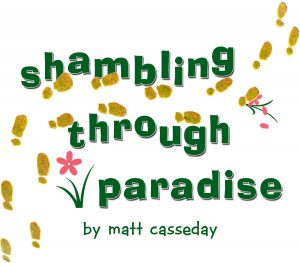Patient 25
 I was getting this occasional pain in my solar plexus, usually after eating. It was a sharp and constant pain, and the most comfortable position during these episodes was standing. I would check my pulse, which was always a steady 60 or so beats a minute. I would google cancers of the stomach, colon, pancreas and liver and read over and over the symptoms, and reassure myself that I had none of the above, while my midsection felt like someone was applying pressure with something hard and pointed. Usually the pain receded within a few hours. One day the pain came and would not go away.
I was getting this occasional pain in my solar plexus, usually after eating. It was a sharp and constant pain, and the most comfortable position during these episodes was standing. I would check my pulse, which was always a steady 60 or so beats a minute. I would google cancers of the stomach, colon, pancreas and liver and read over and over the symptoms, and reassure myself that I had none of the above, while my midsection felt like someone was applying pressure with something hard and pointed. Usually the pain receded within a few hours. One day the pain came and would not go away.
It was a Friday night, standing room only in the ER. After a long uncomfortable wait I was attended to, blood was taken, and I was given a cup in which to urinate. My urine sample looked like a shot of Jack Daniels. Then a bit later, I sat at a desk with a doctor who questioned me about my general health. I could see some charts with my name, upside down on his desk. Either from my blood or urine test. There were various parameters to indicate my condition: Where the numbers of normal health were supposed to be between 1 and 5, the number 12 was written. All down the page, I could make out that my results were off the charts so to speak. My score was a perfect zero, which meant instant admission to the surgery ward.
Most of my friends here consider the idea of being treated for anything at a Costa Rican public hospital to be a life-threatening experience. I am happy to report that I spent 2 weeks confined in the San Isidro del General Hospital– and lived. Confinement is the operative word here—I was on a 4-room ward, about 40 feet by 40 feet, with a small roofed balcony the only area of minimal privacy. The first two nights, I was in a bed in an open area adjacent to the nurses station. The 8-bed rooms were all full and several more of us were set up wherever there was room, awaiting the other patients to either get better or die. I was next to a guy from a rural town near the border with Panama. He had been struck by an atv while cycling and was generally unresponsive. His head was bandaged and one of his legs in a cast. A brother and sister sat with him in shifts, playing music he liked and occasionally reading to him from the bible.
On the third day, I was moved into one of the 8-bed rooms. I had a bed flush against the wall that faced the corridor, closest to the bathroom (two toilets, two showers) that was shared with another of the 8-bed rooms. The corridor and rest room lights were kept on at all hours. Above my bed was a metal square with the number 25—I was patient number 25.
My diagnosis was gallstones, two to be precise, each about one half inch in diameter. I was scheduled for surgery the following week. I could not leave the ward, though after a couple of days I felt good enough to go back to home and work. I had to hold my place in line, so to speak, and waiting in line is an almost sacred tradition here, so my requests to go home and return in time for surgery were received with mild amusement by the doctor and nurses attending me.
Although I was in no real pain, I accepted the pain shot they offered me each afternoon. The reason I accepted was simple. I don’t know what they were injecting me with, but I do know that it made me feel reeaal good. It helped alleviate the boredom. I would walk the floors of the ward like I was floating, pumping sweat, and smiling and jabbering at everyone—nurses, doctors, patients, even the guards from the jail.
Among my ward mates were 3 inmates from the regional jail. Guards working 12-hour shifts kept watch on them. Each prisoner had his own guard, though one could have easily handled the job. One of the prisoners was in the bed closest mine. I named him Vato, as that was what was tattooed on his neck. He was recovering from a stomach operation and had a foot-long stitching across his stomach. I asked Vato how long he had been in jail and he said 17 years. I guessed his age to be 35. He said ,’’Robe’. Robe’ mucho.” He had stolen a lot–at least he was honest about his thievery.
Inmate number 2 was covered in gang style tats and had just had his lower leg amputated. My name for him was Ahab. He had lank shoulder length hair and a tired look, though he too I guessed to be not much more than thirty. He had use of a wheelchair, which he used to race the corridors. He had little interest in using the walker they urged on him. At one point, I overheard him saying he figured he would be in the hospital at least another month. He sounded pleased. They got credit for time served while in the hospital, so they stretched it out as far as possible; they were getting 3 square meals, a bed, attention from nurses and each had his own personal guard!
The third inmate was a quiet emaciated little guy, all skull and collarbones. Him I named Auschwitz. In the hospital setting, these guys were much less frightening than when they were on the outside committing mayhem. Collectively, they would have had trouble unscrewing the lid off of a water bottle.
The night before my scheduled surgery, I was given a razor and a special soap with which to shave all hair from my torso. I also had to fast beginning at 6pm. I awoke Monday morning with a smooth and empty belly. Sometime later in the morning, an attendant came by to tell me the surgery had been cancelled, as it was non urgent, and there had been a bad car accident that morning that took up all available surgeons.
During my second week, they brought in a man in the final throes of dementia. White haired and wizened, he called out ‘’Veeennngggaaa!” and ‘’Puuutaaa!’’ day and night. Family members sat by his bedside during the day, laughing uncomfortably each time he burst out with a sudden shout of “PUUUTTAAA!”
The nurses moved him from room to room, then finally moved him into the same corner by the nurses’ station where I had spent my first nights. Within a few days, his shouts had grown weaker. Then, a few evenings after his arrival, a priest was at his bedside, his family present, sobbing softly. The next morning, his bed was empty, the sheets stripped, an attendant washing down the plastic mattress.
This was actually my second extended stay in this same hospital. Over 20 years earlier I was there to have emergency surgery for the removal of an intestinal parasite. The men’s surgical ward was seemingly unchanged. Even the drab, chipped blue-gray paint job was familiar. Something else unchanged was the attitude of the nurses and attendants. They talked loudly among themselves, laughed, shouted to one another as if they were working in a warehouse, or a factory. They were the workers and we were the product. The old “Hospital Zone—Quiet” signs often seen outside of hospitals were needed inside. In the middle of the night, they would enter the ward, turn on the lights, and converse among themselves as if sitting in a cantina during happy hour. I was already using a hand towel to cover my eyes and simulate darkness to sleep—to this I added rolled up tissue in each ear to muffle the noise.
After a second surgery cancellation, I was rescheduled for Friday, exactly 2 weeks after my admission. Friday morning, fasting, weak, awaiting the call, I struck up a conversation with the guard who was watching over ‘Auschwitz’. I mentioned he seemed so weak and harmless. What could have been his crime? His guard pulled out an iphone and pulled up an article from La Nacion. The article described a horrendous crime—a man had repeatedly raped his 12 year old daughter. She eventually gave birth. Afterward, he continued raping her until she summoned the courage to turn him in. He was now doing 25 years. This was Auschwitz. I looked across the ward at him, propped up on his pillows, staring out the window. I had felt sorry for him because no one had visited him during my two weeks there. Now I knew why.
I dozed off, towel covering my eyes. Drifting in and out of consciousness, I heard a man’s voice say, “Hoy no van a operar. No van a operar en paciente veinticinco”. They are not operating today on patient twenty-five.
I uncovered my eyes and saw the surgeon standing over my bed. He repeated the news. Only one of the four anaesthesiologists had shown up for work that day. Then he offered to put me first on the list for Monday, but with no guarantees. I sat there shaking my head. “Ya me voy!” I told him. I’m outta here!
Maybe Vato, Ahab and Auschwitz would have welcomed the extra hospital stay, but I was at the end of my time there. I signed myself out, went home, and began a segment of my life called ‘’Me and my gallstones’’. I had a subsequent follow up visit at the hospital, during which time they scheduled me for surgery—sometime late in 2017. Hopefully all of the anaesthesiologists will be well that day.
